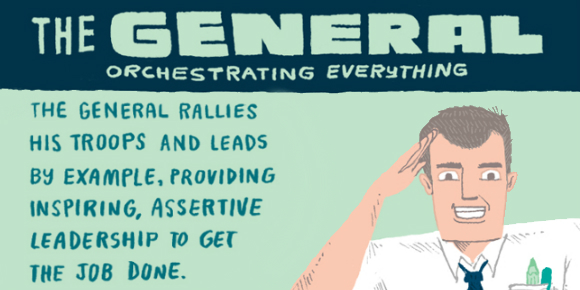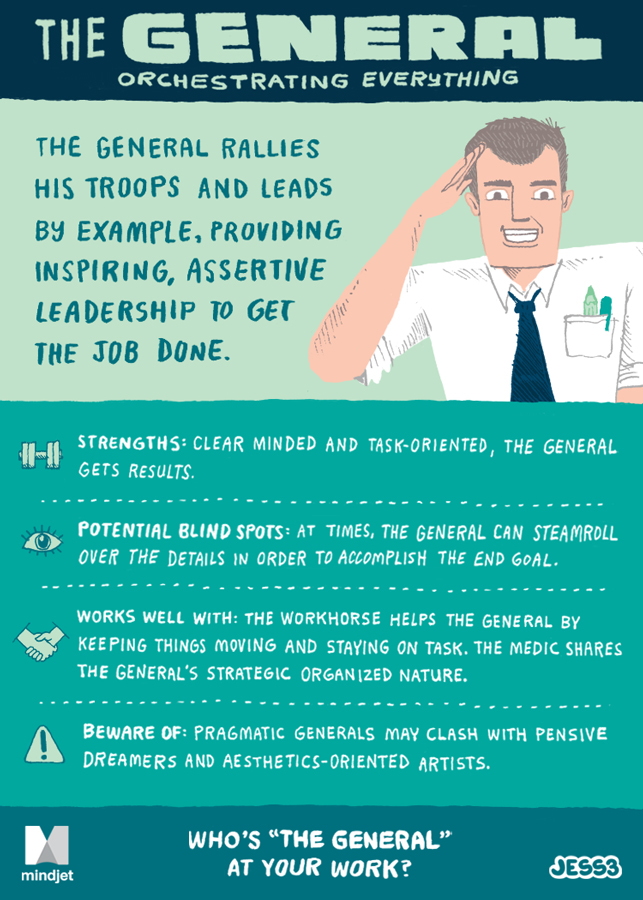Making the most of your work day can be a challenge. Mindjet’s Workology series will help you work smarter and more effectively with your workmates by introducing you to – and providing keys to working with – some common personality types found in any office.
Sarah McCormick is the client engagement director at Canvas, a digital agency based in New York City, and she’s a self-professed General. A charismatic and commanding presence, McCormick believes that being a General is an intrinsic part of her personality. “I honestly think I was this type of leader before I knew this type of leader existed,” she says.
In her role providing leadership for project managers, designers and developers, McCormick values working with engaged and committed team members. “A general is only as strong as their troops,” she notes. “I can’t go into a client meeting with something I’m nervous about. If I don’t have confidence in what I’m presenting, I fall flat. It’s really important that I have support to be the leader I can be. My team is critical to overall success.”
And success is what matters most to Generals. They thrive on setting goals and achieving them. “The feeling of accomplishment — big or small — is really big for me,” says McCormick. But she admits that at times her General personality leads her into conflict with others. “This personality makes it easier to manage things than people,” she admits. Though thankfully, notes John Kaminsky, managing director and partner of Canvas, McCormick is remarkably “in tune” with her troops. “Her ability to read people, talk to them, and earn their respect is what makes her successful.”
Generals, explains Myers-Briggs Type Indicator expert Christine Damrose-Mahlmann, “don’t like people who try to circumvent their duties because they are so committed. They don’t believe in taking shortcuts.” Classified as ESTJs (Extraversion, Sensing, Thinking, Judgment), Generals can have trouble dealing with both change and trust. “As someone who can be a micromanager, it’s important to learn to trust your coworker or staff member,” Damrose-Mahlmann recommends. “The job will get done. It just might not be in the way the General wants it to get done.” Instead, Generals should focus on keeping the team motivated, excited, and on task. According to the Belbin Self-Perception Inventory, which organizes individuals into team roles based on their strengths, the General’s skill set matches up well with Belbin’s “Shaper” role, someone who pushes the team forward and keeps everyone focused.
As a General, McCormick says, “I work best with analytical, data-driven personalities. It complements me to work well with someone who can back up what I’m doing with data. I like dealing with people who are by-the-book.” Flighty, unfocused Dreamers can take a hike. “Sometimes Dreamers drive me crazy, partly because that’s something that I don’t have, and I think I don’t fully understand it.”
In order to get on a General’s good side you have to be proactive and independent—and do the work. “I appreciate people who are Workhorses, who just do it. At some point you’ve got to say, ‘Enough with the talk, no more discussion, let’s actually get it done.’”
McCormick’s advice for other Generals? “As leaders, we’re inherently goal-oriented, and we should make a concerted effort to formulate goals that best meet the needs and wants of the team. After all, individual commitment to a group effort is what makes a team work.”



